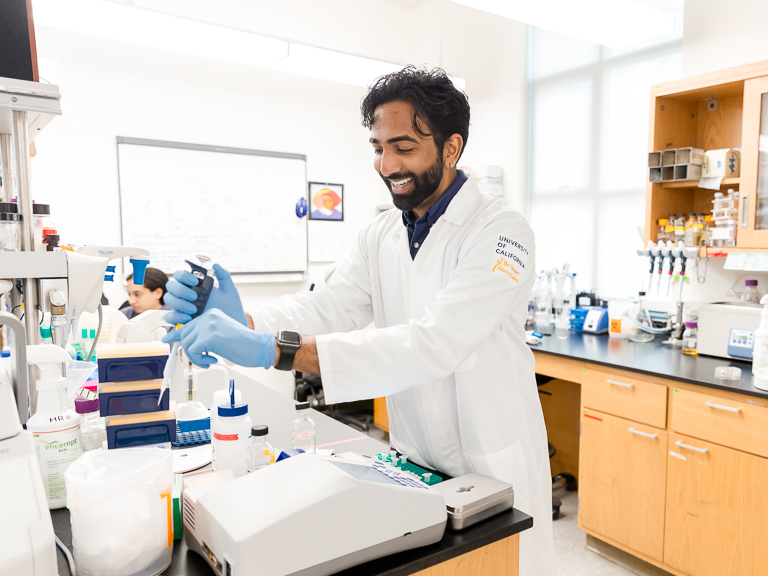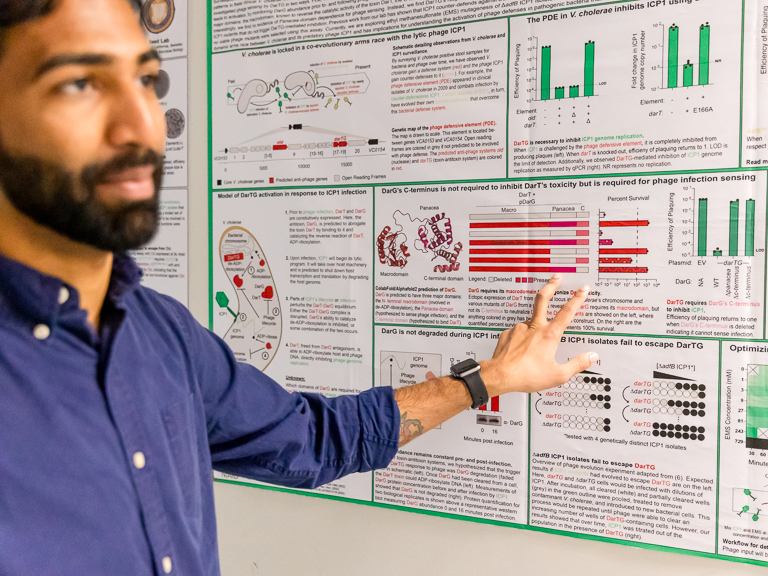
Go to office hours. There are no dumb questions.
Kishen Patel, a sixth-year Ph.D. student doing research at UC Berkeley who has previously worked as a graduate student instructor (GSI), shared their experience and advice with Berkeley Life. When they were an undergraduate biomolecular engineering student at the University of Tennessee, they discovered a keen interest in studying infectious diseases. After branching out into a microbiology lab, they’re now a Ph.D. student at Berkeley’s microbiology department. As Kishen explained, it’s an umbrella program that allows the students within it to explore different immune systems in different labs—all related, but different.
As a Ph.D. student, Kishen gave me insight into both research and teaching. They are required to spend time as a GSI (Graduate Student Instructor) as a part of their program, and they humbly offered me some of their wisdom over a mid-morning coffee at Caffè Strada.

Kishen entering their lab.
What is the goal of your research?
“I divide research into two major branches: There’s science to fill textbooks, and there’s translational science that has a real-world impact. I would say that my research falls under science to fill textbooks, but it’s super important for the foundation of science that has real real-world impact. It’s from a place of curiosity in a lot of ways, but important.”

Kishen in their lab.
Have you ever presented your research in a professional setting?
“I’ve done poster presentations at different conferences, domestic and international. I’ve given a talk at a local regional conference. I’ve also given two talks as part of my program seminar series. I’ve given a talk at a student symposium as well. I love science communication.”

Kishen reviewing their research poster.
What have you learned from being a GSI?
“Students are so smart and so inspiring. The number of times I have had to tell students I don’t know the answer to that question—I have to go research, I gotta go figure it out—and I’ve straight up told students, because I’m not gonna lie to students, right? All my microbiology, public health learning has come from my Ph.D. Sometimes students would just ask me crazy, crazy questions, and they always preface it with “this might be a dumb question,” and that’s exactly the whole point of ‘there are no dumb questions.’ Sometimes, a naive audience is actually the people who are the best question-askers. Students probably teach you more than you teach them.”

Kishen in action!
What is your advice for students working with GSIs?
“Go to office hours! Literally, go to office hours. I know. Truly, I remember all my students who go to office hours. The students who went to office hours, the students who stayed after class to talk to me about things they weren’t understanding—they are the students that I was able to gain a relationship with. In a lot of those cases, I was actually able to even write them letters of recommendation for their future stuff. GSIs are normal people too, you know, do not be afraid of them.”
Takeaway
Hearing how experimenting in research led a Ph.D. candidate to their passion, in tandem with their advice on maintaining relationships with GSIs, led me to one important takeaway: as an undergraduate student, showing up might be the most important thing you can do for your education. Don’t be afraid to go to office hours, get involved in research you’re interested in, and reach out! There’s a plethora of people and resources simply waiting to be discovered.
Milana Berhe, Class of 2028, is majoring in astrophysics and political science and minoring in creative writing.
Want More?
- All Things GSI
- Delve into the GSI role and responsibilities!
- Explore these tips from a GSI